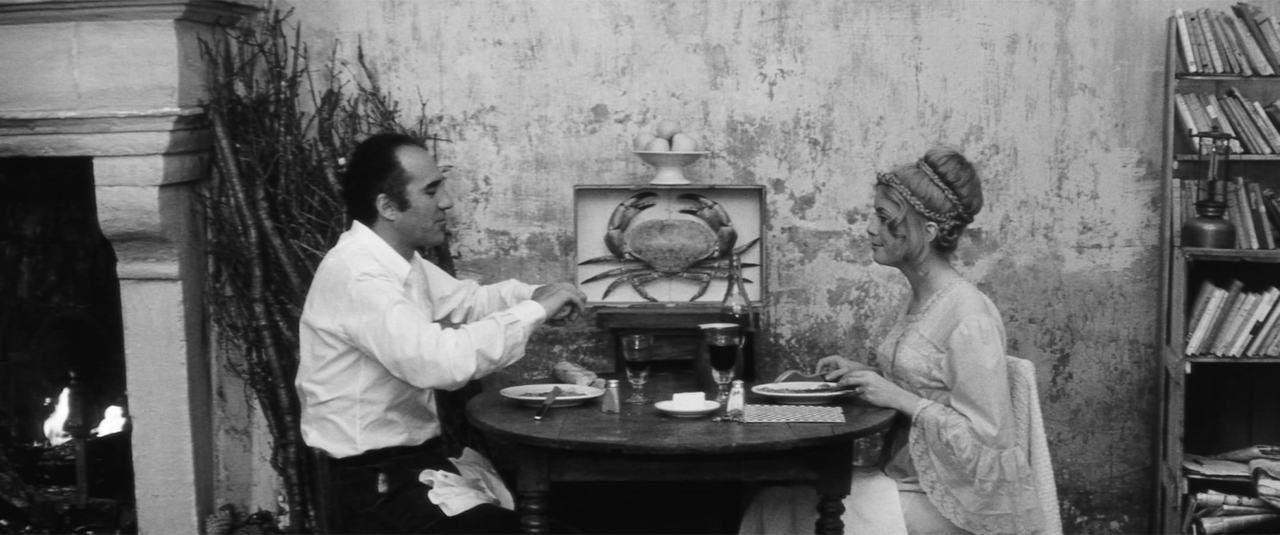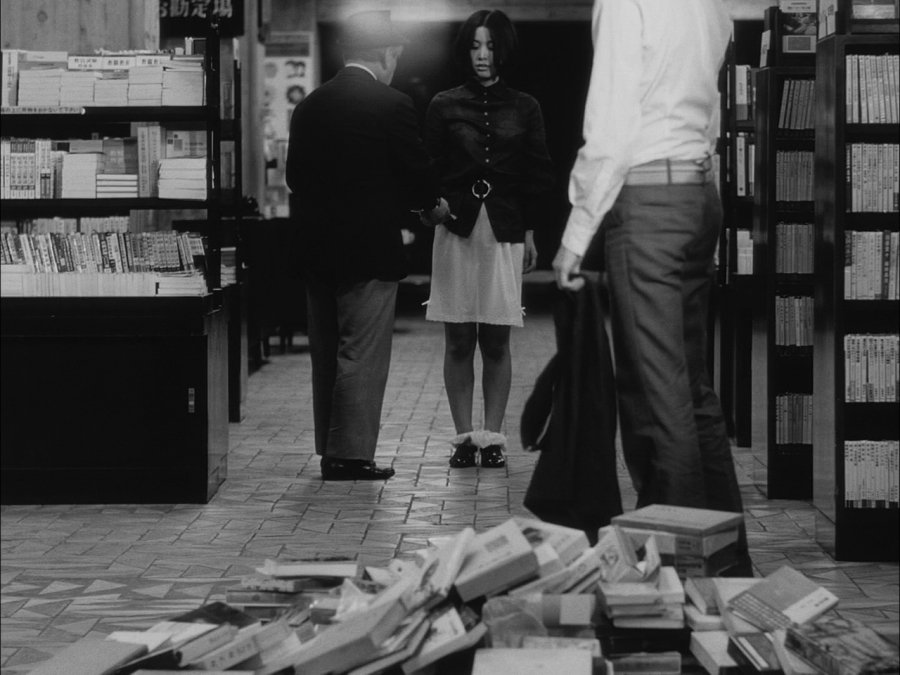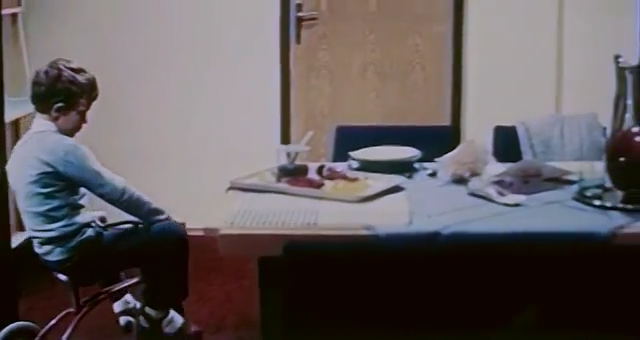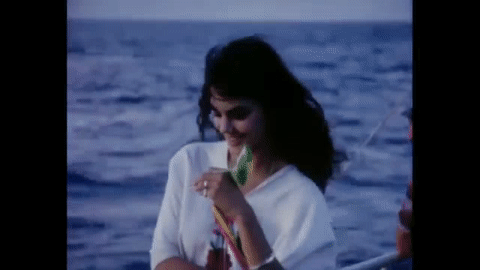– You know what's really awful? – No, tell me. – Getting hooked. It's the end. But, if you only take one shot every once in awhile. Its no different than an occasional drink or cigarette.More (Barbet Schroeder, 1969)
Aug
22
Munchies

Druggies Estelle (Mimsy Farmer) and Stefan (Klaus Grünberg) eating straight from a jar of honey and picking crumbs out of a loaf of bread. There's Coca-Cola product placement and half-eaten foods everywhere. DP: Néstor Almendros.
1960s
– What do you want from this house?
– Want?
– Yes. Want.
– I'm just the servant, miss.
– Get my lunch.The Servant (Joseph Losey, 1963)
Aug
16
National Authenticity Day

Manservant Barrett (Dirk Bogarde) and his master Tony (James Fox). Tony is asleep in a folding chair wearing an overcoat in a sparse room with crumbling walls. Barrett – immaculately dressed in a dark overcoat, hat, gloves, tie – stands in the doorway, looking down on the sleeping man. DP: Douglas Slocombe.
Maléfices [Where the Truth Lies] (Henri Decoin, 1962)
Aug
16
milk

Ronga (Maîthé Mansoura accompanied by cheetah Nyète), sits on a straw-covered floor while holding a bowl with milk. There are potted plants and gardening equipment is placed against the wall. DP: Marcel Grignon.
Les créatures [The Creatures] (Agnès Varda, 1966)
Aug
14

Edgar (Michel Piccoli) and Mylène (Catherine Deneuve) all dressed up for a home-cooked meal. On the wall behind them a huge framed mounted crab. DPs: Willy Kurant, William Lubtchansky & Jean Orjollet.
新宿泥棒日記 [Shinjuku Dorobō Nikki / Diary of a Shinjuku Thief] (Nagisa Ōshima, 1969)
Aug
14
Love Your Bookshop Day

Umeko (Rie Yokoyama) in a bookstore. In the foreground a large messy pile of books. DPs: Seizō Sengen & Yasuhiro Yoshioka.
Umeko (Rie Yokoyama) believes to have caught Torio redhanded (Tadanori Yokoo, whose character has been renamed “Birdey” in the English translation), shoplifting from her bookstore. Torio however is a performance actor – and real-world Art Theatre Guild performer – and the act of stealing is part of his research. The young people's encounter sets something in motion. Together them embark on committing crimes in #Tokyo's labyrinthine #Shinjuku neighbourhood and find their mirror images in a #kabuki play.
新宿泥棒日記 is a playful, dangerous exploration of youth and rebellion in a rapidly shifting Japan.
Sedmi kontinent [Sedmý kontinent / The Seventh Continent] (Dušan Vukotić, 1966)
Aug
12
teevee dinner

A little blond boy on a red tricycle driving past his TV-ish dinner in an empty house. DP: Karol Krška.
Le lit de la vierge (1969)
Marie/M. Magdalène (Zouzou) embracing a lost Jesus (Pierre Clémenti). She's wears a black tunic with a black headscarf, he a white outfit (long johns?) and a crown of thorns. She appears to speak to him. DP: Michel Fournier.

August 10: a Mary for #NationalMaryDay
Le lit de la vierge [The Virgin's Bed] (Philippe Garrel, 1969)
After the dust of May 68 had settled and it became clear that the promised revolution would never be, the young were lost. Filmed in an unscripted haze of drugs and dimmed hope, Le lit de la vierge brings back Jesus [Pierre Clémenti] – now mocked as an astray, confused man and representing the many once-hopeful of '68 – to the desert where he meets Marie, his mother the virgin and the prostitute Marie Magdalène, 60s scene girl Zouzou la twisteuse in a double role.
The mother/whore and hippie aspire a new revolution of sorts, exposing the beach under the pavement as a desert of contemplation.
A gif of Tina Aumont during the filming of “Le lit de la vierge”. From Frédéric Pardo's short psychedelic documentary “Home Movie, autour du 'Lit de la vierge” (1968). DP: Frédéric Pardo.
#Bales2023FilmChallenge #PhilippeGarrel #Zouzou #PierreClémenti #TinaAumont #GroupeZanzibar #JohnCale #Nico #MichelFournier #France #Mai68 #drugs #religion #hippies #Morocco #1960s
“Don't you recognise me?”Drak sa vracia [Dragon's Return / The Return of Dragon] (Eduard Grečner, 1968)
Aug
9
Smokey Bear Day

Drak (Radovan Lukavský), a Caucasian man with a rough looking face and an eyepatch over his left eye. The landscape behind him is mere blurs. DP: Vincent Rosinec.
Drak [“dragon” or “devil”] returns to his village. No one understands why he came back, or where he has been. The villagers postulate smugglers and there's other drunk nefarious thoughts, but for sure they know that with the potter, the draught returned. In an unspoken ritual sung in old tongues, the grey women summon the rain. The forest, dry as tinder, has taken the cattle, all there is. Drak knows where the animals went and a deal is struck.
– Drak
Drak sa vracia speaks in mere whispers and smoky greys. The main characters – the #fire, smoke, pottery, and composer Ilja Zeljenka's often silent motif – weave their wordless presence throughout the ancient landscape; that same landscape that carved itself into the locals' being.
L'œil du malin [The Eye of Evil / The Third Lover] (Claude Chabrol, 1962)
Aug
8

A table covered with a neatly ironed table cloth and on it, several stacks of flat and soup plates, plus silverware and nesting aluminium pans. DP: Jean Rabier.
Drak sa vracia [Dragon's Return] (Eduard Grečner, 1968)
Aug
6

Eva (Emília Vášáryová) stares into the fire on which a small anthropomorphic cooking vessel is mounted. DP: Vincent Rosinec.
